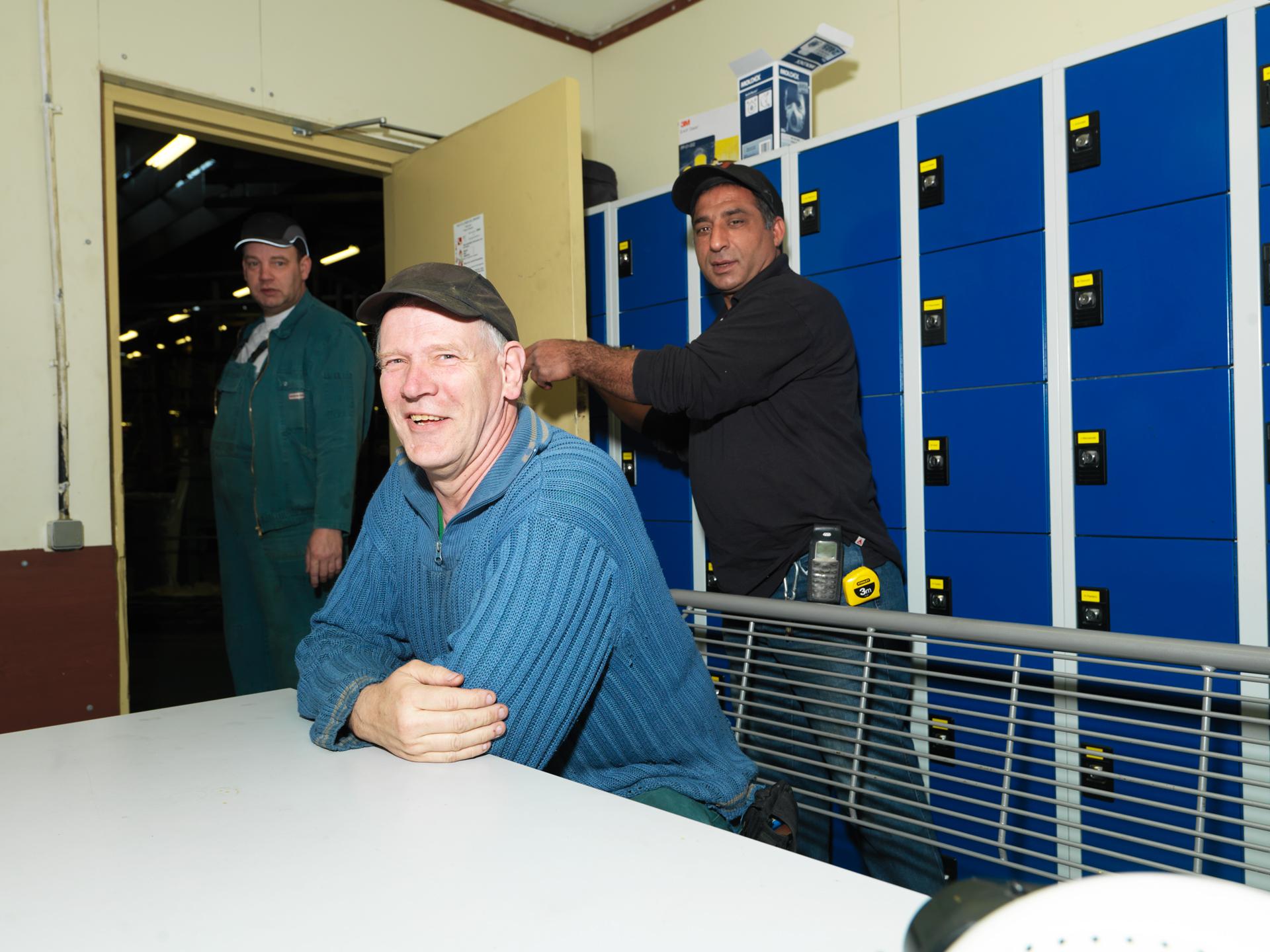Reducing Absence
Healthy employees make a healthy company. Restricting or even preventing sickness absence is vital to your business operations. Read all about preventing and reducing absence here.
What is absence?
Absence means that an employee does not show up at work and gives 'sickness' as the reason for this. They may report sick for a short period of time, because they have the flu for example, but also for a longer period of time. Accordingly, there is a difference between short and long-term absence.
Employers and employees are subject to a number of obligations, starting in the week of the absence notification. These are laid down in the Eligibility for Permanent Invalidity Benefit (Restrictions) Act.
Short Frequent Absence
It simply happens that someone gets the flu or, for example, a migraine attack. If an employee frequently reports sick for a short period of time, it is wise to discuss this together, because long-term absence is often preceded by frequent short-term absence. Your employee may not feel motivated or they have a bad work/life balance.
Long-Term Absence
Long-term absence is when your employee is absent for six weeks or more. The company doctor examines the situation, draws up a problem analysis and provides constructive advice. This allows you – together with your employee – to make arrangements about the work that the employee is able to perform. You also draw up an action plan together, in which you describe how you picture the rehabilitation.
If you have been ill for 42 weeks or more, you must notify the UWV. Has it come to the point where your employee has been ill for two years and has not been able to work during that period and has no prospect of recovery either? In that case, you may apply for permission for dismissal.
Absence Due to Psychological Complaints
More than one third of long-term absence in SMEs has a psychological background. That share has been rising for years. On average, you lose someone for 9 months. Stress-related absence in particular has increased; to 25% of long-term absence.
If you recognise psychological absence at an early stage, this can lead to a considerable reduction in the duration of absence. On average, you can then reduce the duration of absence by 25 days, which amounts to a saving of €7,500 per employee.
Labour Dispute and Absence
It also happens that an employee reports sick when they have a difference of opinion with their employer, which is called an labour dispute. If this happens to you, it is important to talk to your employee. If they persist in their sickness notification, schedule a meeting with the company doctor as soon as possible. Only the company doctor can determine whether or not the employee is ill for medical reasons.
In order to resolve the conflict, you can call in an (external) intermediary, such as a mediator or company social worker. Of course, you do not have to pursue this line of action until an employee has reported sick. You will want to be ahead of the sickness notification.
By preventing labour conflicts, you work towards a pleasant working atmosphere, your employees are more motivated and productive, and you prevent absenteeism. What can you do to prevent conflicts? And how do you resolve them? Find out with this checklist.
Absence and Holidays
In order to be clear on the rules regarding illness during holidays, it is wise to include rules about this in your company's absence regulations. If your sick employee wants to go on holiday, we advise you to ask the company doctor for advice.
The Costs of Absence
One day's absence costs an average of 340 euros. You continue to pay (part of) the wages, have to arrange a replacement for your sick employee and you probably incur a loss of turnover and/or production. Depending on your contract with the occupational health and safety service, you will also have to take into account costs associated with absence management and rehabilitation. You can reduce absence-related costs by intervening in good time and ensuring that your employee gets the appropriate help quickly.

Preventing Absence
Read below what you can do to prevent absence.
Occupational Health and Safety Service
Your occupational health and safety service plays an important role in preventing and reducing absence. The core task of the occupational health and safety service is to help employers and employees with their working conditions policy and absence policy. An effective policy enables you to prevent absence. For example, by providing insight into the risks within the company through a risk assessment, and by identifying the health risks through a Preventative Medical Examination (PME). We offer two different PME's: PME Vitality and PME Personal.
The occupational health and safety service is best known for absence management, because when assisting sick employees, it is mandatory to have a company doctor assist you. The company doctor also plays an important role in reducing and preventing absence. More on this later.
Absence Management
Effective absence management is crucial for a quick, responsible rehabilitation and for limiting the duration of absence as much as possible. As mentioned above, you are obliged by law to have yourself assisted by a company doctor in the management of sick employees. Within 6 weeks after the sickness notification, they will draw up a Problem Analysis and advice, allowing you and your employee can draw up a rehabilitation action plan. A case manager – at ArboNed that is the process director or rehabilitation and prevention advisor – ensures that all absence management steps are completed carefully and in good time.
Absence Policy
Not every company has an absence policy, but an effective absence policy can help you reduce absence. An absence policy describes how your organisation deals with absence. The steps to follow in the event of a sickness notification (the absence protocol) and the rights and obligations of you as an employer and of your employee.
Absence Protocol
If one of your employees is sick, even for just one day, there are a number of steps that you are required to follow. Put these steps on paper so that you do not forget anything and they are clear to everyone in your organisation. To whom, how and by what time should your employee report sick? What information do you need to report sick? How does it work with a sickness notification and holiday? You include that and more in the absence protocol.
Absence Analysis
An absence analysis allows you to check the absence situation in your company and how you can optimise your absence policy. The analysis shows which problems there are within your organisation in the area of absence; per individual and organisation-wide.
Risk Assessment
An up-to-date risk assessment allows you to reduce the risks in your company and prevent absence proactively. Every company with personnel is obliged to make an inventory through a risk assessment of whether and how the work can be hazardous or unhealthy for employees, and must take measures in this respect.
Preventative Medical Examination (PME)
With a PME from ArboNed you meet your statutory obligation and your employees gain insight into their health and lifestyle. In this way you prevent absence. We offer two differten PME's: PME Vitality and PME personal.
Medical Examinations
In order to enable your employees to do their work properly and safely, it is important to check regularly whether they are able to meet the (heavy) demands that the work places on them. Medical examinations are compulsory for certain occupations. Please contact our Medical Examinations office via 0251 26 15 50
Work Engagement
Engagement among your employees can help prevent absence. Engaged employees make fewer mistakes, have fewer accidents, and are more productive, innovative and creative. Engagement ensures that employees feel involved and experience a higher level of job satisfaction. It cushions the experience of stress, so they experience less work-related stress.
Who Helps Prevent Absence?
As an employer (together with your direct managers) you play an important role in reducing and preventing absence, but you are not on your own in this. The health and safety professionals will help you to minimise absence within your company.
Company Doctor
The company doctor is probably the best-known occupational health and safety professional. The company doctor is someone who gives advice in the area of employment and health. Companies can call in a company doctor, usually through an occupational health and safety service, to give advice and support with regard to improving working conditions. They also help employees return to work as quickly and responsibly as possible. Every employee has the right to visit a company doctor's walk-in surgery hours – for advice on individual, person-specific health questions in relation to work.
Occupational Health Specialist
The occupational health specialist helps companies to prevent health damage among employees. Companies call in an occupational health specialist to assess a work situation, and if they identify health risks, they will look for a solution. As an employer, you can then address the risks or have them addressed and improve the sustainable employability of your people.
The occupational health specialist also informs companies about hazardous materials, personal protective equipment (PPE), harmful noise and working in hot temperatures. They can also assist employers in updating and implementing the risk assessment.
Ergonomist
The (registered) ergonomist focuses on efficient and healthy working practices. With their specialist knowledge, they help prevent physical strain on employees. In this way, the ergonomist also plays an important role in the sustainable employability of employees.
Employment and Organisation Consultant
The employment and organisation expert advises and encourages you and your organisation to create a work culture that fosters engagement and vitality.
Company Social Worker
The company social worker concentrates on problems in your employee's social environment. They always address the problems with a view to the consequences for work. A great advantage of working with a company social worker is that they can help prevent absence or accelerate the rehabilitation of your employee in a responsible manner.
Confidential Counsellor
The Working Conditions Act obliges all employers to offer their employees a safe working environment. This means, among other things, that you must pay attention to work-related psychosocial stress (WPS). Psychological absence is mainly related to WPS: discrimination and sexual harassment, aggression and violence, bullying and work pressure. Appointing a confidential counsellor means that you fulfil the statutory obligation. The confidential counsellor is usually someone from within the organisation, but you can also hire an external confidential counsellor.
Employment Expert
If an employee reports stick, the employment expert will work towards a speedy and responsible return to work. They do not think in terms of limitations, but look at the possibilities for your sick employee to return to work. For instance by making adjustments in the workplace or looking for other work in or outside your organisation.
Prevention Worker
A prevention worker is someone who works within a company – usually in addition to their regular job – to help prevent accidents and absence. Every company with personnel is obliged to appoint a prevention worker. In a company with fifteen or fewer employees, the director/owner may assume the role of prevention worker. Are you interested in following a training 'Prevention Worker'? Please contact our Academy via 030-2996363
Do you have questions or do you want to make an appointment?
We are happy to help you.
Call us
+31 30 299 6444
E-mail us
info@arboned.nl
Call back request
Schedule now
